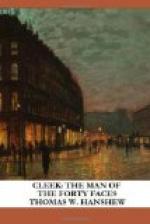“Yes, it was I that called,” she replied, making a brave front of it. “But I do not think it was you that I called to. Keep away, please. Don’t come any nearer. What do you want?” “Well, I’ll take that blessed ’and-bag to go on with; and if there aren’t no money in it—tumble it out—let’s see—lively now! I’ll feed for the rest of this week—Gawd, yuss!”
She made no reply, no attempt to obey him, no movement of any sort. Fear had absolutely stricken every atom of strength from her. She could do nothing but look at him with big, frightened eyes, and shake.
“Look ‘ere, aren’t you a-goin’ to do it quiet, or are you a-goin’ to mike me tike the blessed thing from you?” he asked.
“I’ll do it if you put me to it—my hat! yuss! It aren’t my gime—I’m wot you might call a hammer-chewer at it, but when there’s summink inside you, wot tears and tears and tears, any gime’s worth tryin’ that pulls out the claws of it.”
She did not move even yet. He flung the spent match from him, and made a sharp step toward her, and he had just reached out his hand to lay hold of her, when another hand—strong, sinewy, hard-shutting as an iron clamp—reached out from the mist, and laid hold of him; plucking him by the neckband and intruding a bunch of knuckles and shut fingers between that and his up-slanted chin.
“Now, then, drop that little game at once, you young monkey!” struck in the sharp staccato of a semi-excited voice. “Interfering with young ladies, eh? Let’s have a look at you. Don’t be afraid, Miss Lorne—nobody’s going to hurt you.”
Then a pocket torch spat out a sudden ray of light; and by it both the half-throttled boy and the wholly frightened girl could see the man who had thus intruded himself upon their notice.
“Oh, it is you—it is you again, Mr. Cleek?” said Ailsa with something between a laugh and a sigh of relief as she recognized him.
“Yes, it is I. I have been behind you ever since you left the house in Bardon Road. It was rash of you to cross the heath at this time and in this weather. I rather fancied that something of this kind would be likely to happen, and so took the liberty of following you.”
“Then it was you I heard behind me?”
“It was I—yes. I shouldn’t have intruded myself upon your notice if you hadn’t called out. A moment, please. Let’s have a look at this young highwayman, who so freely advertises himself as an amateur.”
The light spat full into the gaunt, starved face of the young man and made it stare forth doubly ghastly. He had made no effort to get away from the very first. Perhaps he understood the uselessness of it, with that strong hand gripped on his ragged neckband. Perhaps he was, in his way, something of a fatalist—London breeds so many among such as he: starved things that find every boat chained, every effort thrust back upon them unrewarded. At any rate, from the moment he had heard the girl give to this man a name which every soul in England had heard at one time or another during the past two years, he had gone into a sort of mild collapse, as though realising the utter uselessness of battling against fate, and had given himself up to what was to be.




